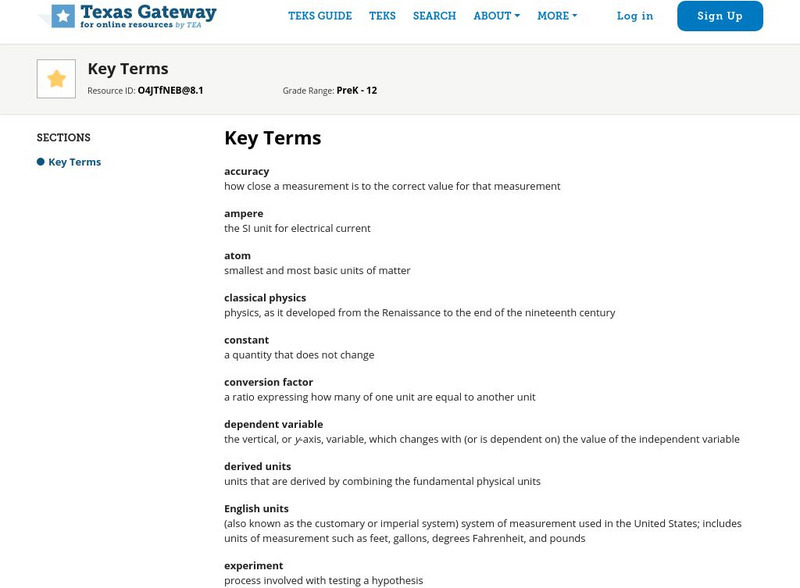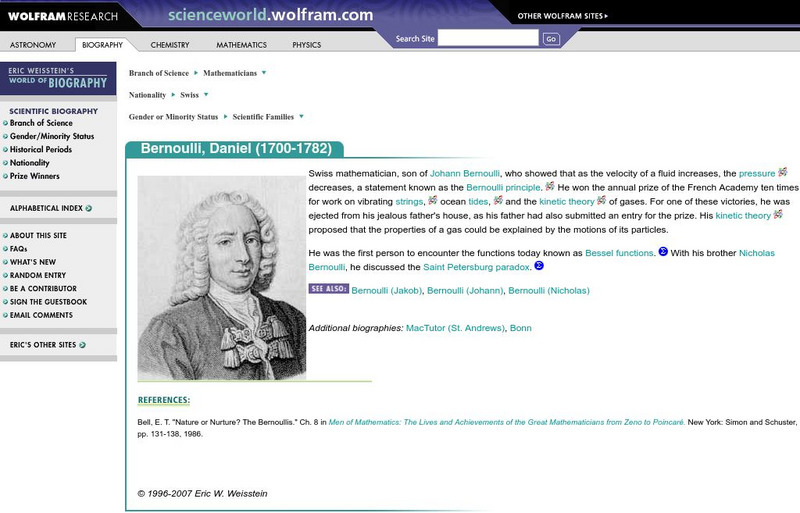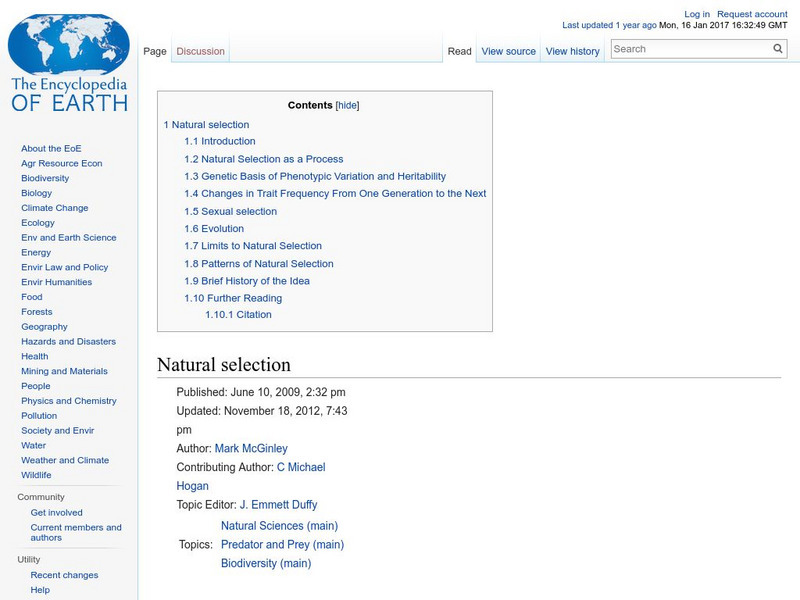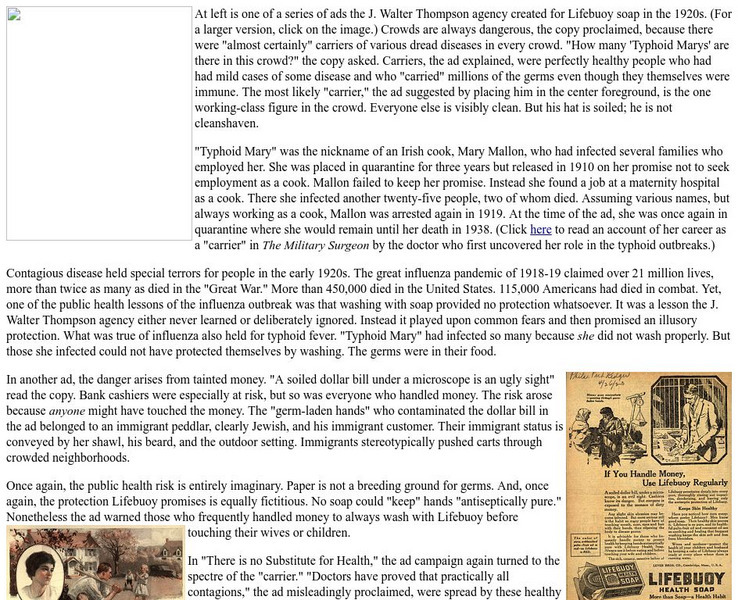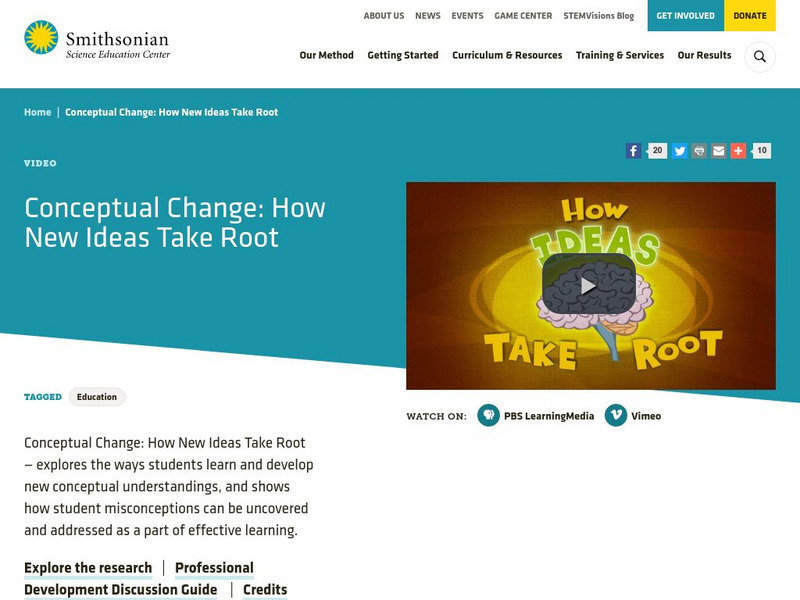Hi, what do you want to do?
The History Cat
The History Cat: Galileo on Trial
An explanation of the rationale behind the trial of Galileo by the Roman Catholic Inquisition for his scientific theories of heliocentrism. He was convicted of heresy and placed under house arrest, eventually confessing to his alleged...
City University of New York
Exploring Life: The First Cells
A brief essay about older and more recent ideas on when the first cells evolved. Good coverage of different scientific theories about the origin of life.
Math Science Nucleus
I. Science Ma Te: Integrating Science, Math and Technology
This site offers a wealth of online textbook-related materials that encourage the discovery of science in the world around us. Enter the site to access material on specific topics. Each section contains reading material (complete with...
Texas Education Agency
Texas Gateway: What Is Physics?: Key Terms
This is a glossary of key terms and definitions used in Chapter 1: What is Physics? from the online TEA Physics text.
Famous Scientists
Famous Scientists: Ernst Mayr
Read about the life and work Ernst Mayr, one of 20th century's leading evolutionary biologists.
Wolfram Research
Wolfram Science World: Daniel Bernoulli
This site from ScienceWorld provides a brief biography of Daniel Bernoulli's major scientific accomplishments, including Bernoulli's principle, vibrating strings, ocean tides, and the kinetic theory of gases. Links are included to...
BBC
Bbc History: Historic Figures: Francis Bacon (1561 1626)
BCC provides a short summary of the life of Francis Bacon (1561-1626 CE) who is best remembered for promoting the 'Scientific Method' of testing a theory.
University of St. Andrews (UK)
University of St. Andrews: Augustin Fresnel
A short biographical sketch on the life and work of Augustin Fresnel (1788-1827). Comments on a few of his scientific accomplishments.
Trinity College Dublin
The History of Mathematics: Young
A short sketch of the life and work of Thomas Young (1773-1829 CE). Traces early upbringing and education and his scientific discoveries and contributions.
ClassFlow
Class Flow: The Big Bang
[Free Registration/Login Required] Students often have a difficult time comprehending the timescale and distances of the universe. I have used this flipchart to start the discussion of the formation of our universe and how we know about...
Simon Fraser University
Chem1 Virtual Textbook: What Is Pseudoscience?
Pseudoscience studies various fields of science that make claims to be legitimate, but researchers and academics argue that pseudoscientific discoveries do not hold up to typical standards of testing and proof. Examples are the Lunar...
ClassFlow
Class Flow: What Happened to Pluto?
[Free Registration/Login Required] This flipchart was created to teach students about Pluto and the recent news of it NOT being a planet (officially). Lots of ways for students to vote on why as well as discussions about what other facts...
Wolfram Research
Wolfram Science World: Fresnel, Augustin
This site from ScienceWorld provides a short biographical sketch of Augustin Fresnel (1788-1827 CE) and describes his most notable scientific discoveries and contributions. Links are provided throughout for additional information.
Other
Hyper Jeff Network: History of Classic Electromagnetism
This site from the HyperJeff Network provides a timelined history of scientific thought and discoveries about classic electromagnetism. Includes links to the biographies of famous people and discoverers; the time period covered ranges...
Interactive Mathematics
Interactive Mathematics: Probability and Statistics
Mini lessons are provided for learning concepts in the world of probability and statistics. Topics include counting and probability, permutations, combinations, independent and dependent events, and distributions. Links to online...
Smithsonian Institution
Lemelson Center: Spark!lab: Polishing Pennies
Learn about acids and bases during this penny-polishing experiment. Students will hypothesize what substances will polish pennies and then test their hypothesis.
Encyclopedia of Earth
Encyclopedia of Earth: Natural Selection
Scientific article explaining what natural selection is, and how it manifests itself through genetics and from generation to generation. Natural selection is compared to genetic drift, both of which cause evolution to occur. The limits...
Other
Contagion: The Spread of Eugenics Throughout American Popular Culture in the 20s
A comprehensive look at the theory of eugenics, the pseudo-scientific idea that fed into the nativists' search for the "superior" American. This article explains how companies used this theory to sell their products.
Other
History World: Greek Science Timeline
A timeline of scientific discoveries and theories of the ancient Greeks. It covers the period from 585 BC to 150 AD, with three additional entries for related events in the 1900s. Each entry has links to additional content on the website...
Albright-Knox Art Gallery
Albright Knox Art Gallery: Painting an Impression
Impressionists used new methods of mixing colors based on contemporary scientific writings about optics. This lesson plan explores the theory of optical color mixing, painting the same subject under different conditions of light, and the...
PBS
Pbs Frontline: Last Battle of the Gulf War
A close-up look at the history and politics behind 'Gulf War Syndrome,' examining the key scientific and medical issues. Includes major theories, interviews with key players and an examination of the role of the media.
Smithsonian Institution
Smithsonian Science Education Center: Conceptual Change: How New Ideas Take Root
Develop a more nuanced understanding of how student ideas are formed both in and outside of the classroom. By understanding the student's misconceptions on scientific ideas, you can better structure your lesson to be more effective. This...
Vision Learning
Visionlearning: Physics: Light I: Particle or Wave
Instructional module focusing on light. Discussion includes historical development of particle versus wave theories and the scientific studies leading to the understanding of light waves today. Site also includes an interactive practice...








